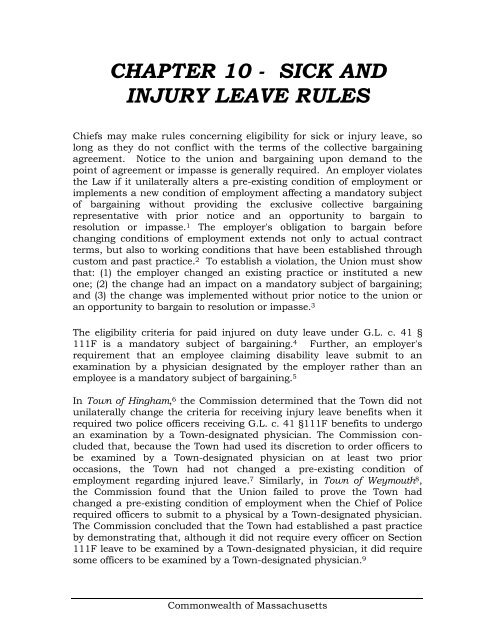Management Rights - AELE's Home Page
Management Rights - AELE's Home Page
Management Rights - AELE's Home Page
Create successful ePaper yourself
Turn your PDF publications into a flip-book with our unique Google optimized e-Paper software.
CHAPTER 10 - SICK AND<br />
INJURY LEAVE RULES<br />
Chiefs may make rules concerning eligibility for sick or injury leave, so<br />
long as they do not conflict with the terms of the collective bargaining<br />
agreement. Notice to the union and bargaining upon demand to the<br />
point of agreement or impasse is generally required. An employer violates<br />
the Law if it unilaterally alters a pre-existing condition of employment or<br />
implements a new condition of employment affecting a mandatory subject<br />
of bargaining without providing the exclusive collective bargaining<br />
representative with prior notice and an opportunity to bargain to<br />
resolution or impasse. 1 The employer's obligation to bargain before<br />
changing conditions of employment extends not only to actual contract<br />
terms, but also to working conditions that have been established through<br />
custom and past practice. 2 To establish a violation, the Union must show<br />
that: (1) the employer changed an existing practice or instituted a new<br />
one; (2) the change had an impact on a mandatory subject of bargaining;<br />
and (3) the change was implemented without prior notice to the union or<br />
an opportunity to bargain to resolution or impasse. 3<br />
The eligibility criteria for paid injured on duty leave under G.L. c. 41 §<br />
111F is a mandatory subject of bargaining. 4 Further, an employer's<br />
requirement that an employee claiming disability leave submit to an<br />
examination by a physician designated by the employer rather than an<br />
employee is a mandatory subject of bargaining. 5<br />
In Town of Hingham, 6 the Commission determined that the Town did not<br />
unilaterally change the criteria for receiving injury leave benefits when it<br />
required two police officers receiving G.L. c. 41 §111F benefits to undergo<br />
an examination by a Town-designated physician. The Commission concluded<br />
that, because the Town had used its discretion to order officers to<br />
be examined by a Town-designated physician on at least two prior<br />
occasions, the Town had not changed a pre-existing condition of<br />
employment regarding injured leave. 7 Similarly, in Town of Weymouth 8 ,<br />
the Commission found that the Union failed to prove the Town had<br />
changed a pre-existing condition of employment when the Chief of Police<br />
required officers to submit to a physical by a Town-designated physician.<br />
The Commission concluded that the Town had established a past practice<br />
by demonstrating that, although it did not require every officer on Section<br />
111F leave to be examined by a Town-designated physician, it did require<br />
some officers to be examined by a Town-designated physician. 9<br />
Commonwealth of Massachusetts
















